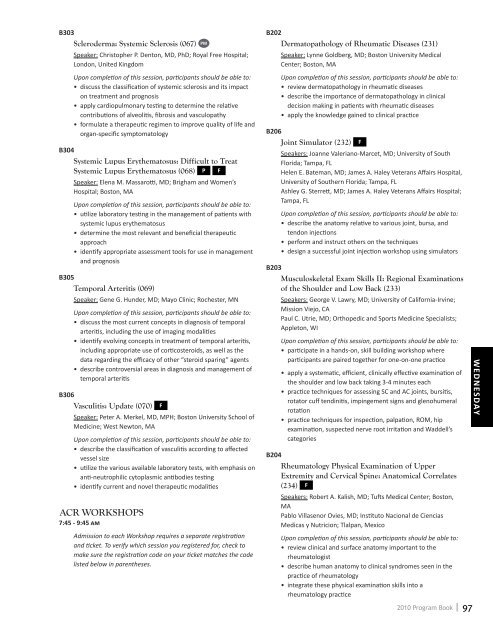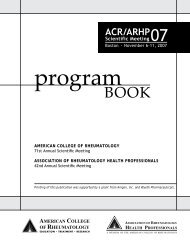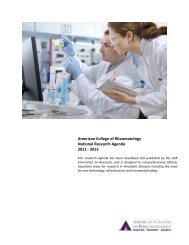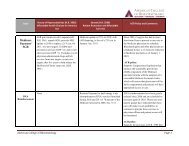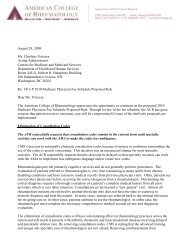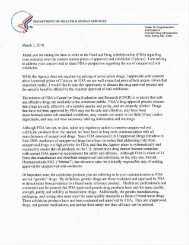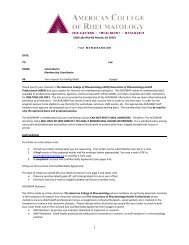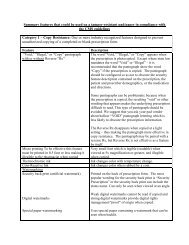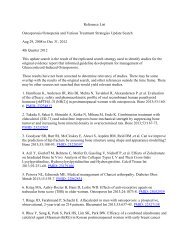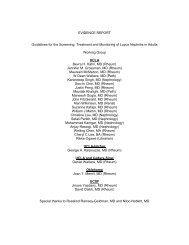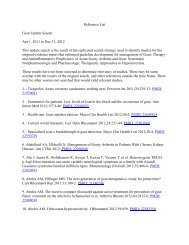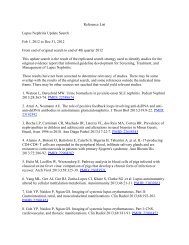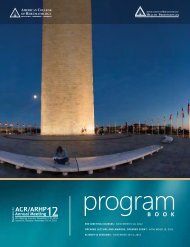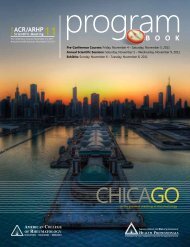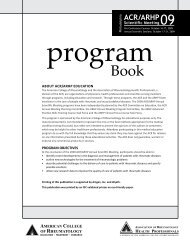B O O K - American College of Rheumatology
B O O K - American College of Rheumatology
B O O K - American College of Rheumatology
You also want an ePaper? Increase the reach of your titles
YUMPU automatically turns print PDFs into web optimized ePapers that Google loves.
B303<br />
Scleroderma: Systemic Sclerosis (067) PM<br />
Speaker: Christopher P. Denton, MD, PhD; Royal Free Hospital;<br />
London, United Kingdom<br />
B202<br />
Dermatopathology <strong>of</strong> Rheumatic Diseases (231)<br />
Speaker: Lynne Goldberg, MD; Boston University Medical<br />
Center; Boston, MA<br />
Upon completion <strong>of</strong> this session, participants should be able to:<br />
• discuss the classification <strong>of</strong> systemic sclerosis and its impact<br />
on treatment and prognosis<br />
• apply cardiopulmonary testing to determine the relative<br />
contributions <strong>of</strong> alveolitis, fibrosis and vasculopathy<br />
• formulate a therapeutic regimen to improve quality <strong>of</strong> life and<br />
organ-specific symptomatology<br />
B304<br />
Systemic Lupus Erythematosus: Difficult to Treat<br />
Systemic Lupus Erythematosus (068) P f<br />
Speaker: Elena M. Massarotti, MD; Brigham and Women’s<br />
Hospital; Boston, MA<br />
Upon completion <strong>of</strong> this session, participants should be able to:<br />
• utilize laboratory testing in the management <strong>of</strong> patients with<br />
systemic lupus erythematosus<br />
• determine the most relevant and beneficial therapeutic<br />
approach<br />
• identify appropriate assessment tools for use in management<br />
and prognosis<br />
B305<br />
Temporal Arteritis (069)<br />
Speaker: Gene G. Hunder, MD; Mayo Clinic; Rochester, MN<br />
Upon completion <strong>of</strong> this session, participants should be able to:<br />
• discuss the most current concepts in diagnosis <strong>of</strong> temporal<br />
arteritis, including the use <strong>of</strong> imaging modalities<br />
• identify evolving concepts in treatment <strong>of</strong> temporal arteritis,<br />
including appropriate use <strong>of</strong> corticosteroids, as well as the<br />
data regarding the efficacy <strong>of</strong> other “steroid sparing” agents<br />
• describe controversial areas in diagnosis and management <strong>of</strong><br />
temporal arteritis<br />
B306<br />
Vasculitis: Update (070) f<br />
Speaker: Peter A. Merkel, MD, MPH; Boston University School <strong>of</strong><br />
Medicine; West Newton, MA<br />
Upon completion <strong>of</strong> this session, participants should be able to:<br />
• describe the classification <strong>of</strong> vasculitis according to affected<br />
vessel size<br />
• utilize the various available laboratory tests, with emphasis on<br />
anti-neutrophilic cytoplasmic antibodies testing<br />
• identify current and novel therapeutic modalities<br />
ACR Workshops<br />
7:45 - 9:45 am<br />
Admission to each Workshop requires a separate registration<br />
and ticket. To verify which session you registered for, check to<br />
make sure the registration code on your ticket matches the code<br />
listed below in parentheses.<br />
Upon completion <strong>of</strong> this session, participants should be able to:<br />
• review dermatopathology in rheumatic diseases<br />
• describe the importance <strong>of</strong> dermatopathology in clinical<br />
decision making in patients with rheumatic diseases<br />
• apply the knowledge gained to clinical practice<br />
B206<br />
Joint Simulator (232) f<br />
Speakers: Joanne Valeriano-Marcet, MD; University <strong>of</strong> South<br />
Florida; Tampa, FL<br />
Helen E. Bateman, MD; James A. Haley Veterans Affairs Hospital,<br />
University <strong>of</strong> Southern Florida; Tampa, FL<br />
Ashley G. Sterrett, MD; James A. Haley Veterans Affairs Hospital;<br />
Tampa, FL<br />
Upon completion <strong>of</strong> this session, participants should be able to:<br />
• describe the anatomy relative to various joint, bursa, and<br />
tendon injections<br />
• perform and instruct others on the techniques<br />
• design a successful joint injection workshop using simulators<br />
B203<br />
Musculoskeletal Exam Skills II: Regional Examinations<br />
<strong>of</strong> the Shoulder and Low Back (233)<br />
Speakers: George V. Lawry, MD; University <strong>of</strong> California-Irvine;<br />
Mission Viejo, CA<br />
Paul C. Utrie, MD; Orthopedic and Sports Medicine Specialists;<br />
Appleton, WI<br />
Upon completion <strong>of</strong> this session, participants should be able to:<br />
• participate in a hands-on, skill building workshop where<br />
participants are paired together for one-on-one practice<br />
• apply a systematic, efficient, clinically effective examination <strong>of</strong><br />
the shoulder and low back taking 3-4 minutes each<br />
• practice techniques for assessing SC and AC joints, bursitis,<br />
rotator cuff tendinitis, impingement signs and glenohumeral<br />
rotation<br />
• practice techniques for inspection, palpation, ROM, hip<br />
examination, suspected nerve root irritation and Waddell’s<br />
categories<br />
B204<br />
<strong>Rheumatology</strong> Physical Examination <strong>of</strong> Upper<br />
Extremity and Cervical Spine: Anatomical Correlates<br />
(234) f<br />
Speakers: Robert A. Kalish, MD; Tufts Medical Center; Boston,<br />
MA<br />
Pablo Villasenor Ovies, MD; Instituto Nacional de Ciencias<br />
Medicas y Nutricion; Tlalpan, Mexico<br />
Upon completion <strong>of</strong> this session, participants should be able to:<br />
• review clinical and surface anatomy important to the<br />
rheumatologist<br />
• describe human anatomy to clinical syndromes seen in the<br />
practice <strong>of</strong> rheumatology<br />
• integrate these physical examination skills into a<br />
rheumatology practice<br />
2010 Program Book 97<br />
wednesday


